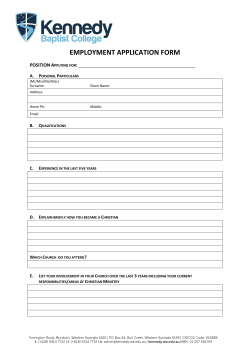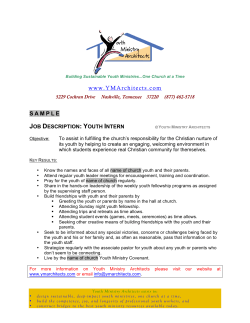
EDUCATION for MINISTRY (EfM)
Education for Ministry Called to Ministry E The Education for Ministry program began as a distancelearning program of The School of Theology in 1975 with a vision of enrolling a few hundred learners. Within a few years it developed into a program reaching several thousand participants in groups in the U.S. and around the globe. very baptized person is called to ministry. During the service of confirmation we ask God to “Renew in these your servants the covenant you made with them at Baptism. Send them forth in the power of the Spirit to perform the service you set before them.” EfM can be found in the United Kingdom, New Zealand, Australia, Canada, the Bahamas, Hong Kong, and Botswana, in addition to the approximately 7,300 participants enrolled in nearly 900 EfM groups throughout the U.S. More than 80,000 persons have participated in the program since its inception, and in the United States more than 37,000 have completed the four years. Ninety-one of the 110 dioceses of The Episcopal Church, as well as other denominations, have contractual arrangements with EfM. Lay-persons face the difficult and often subtle task of interpreting the richness of the church’s faith in a complex and confusing world. They need a theological education that supports their faith and helps them to connect that faith to their daily lives. The EfM program provides people with an opportunity to discover how to respond to the call to Christian service and carry out their ministries. The Beecken Center of The School of Theology EfM invites participants into small, mentored groups that provide the framework for understanding life and shaping actions as Christian faith is deepened. EfM seminar groups meet in both local settings and online, eliminating the need to travel to Sewanee to access The School of Theology’s premier educational resources. The program does not evaluate or recommend individuals for ordination. The Beecken Center of The School of Theology is dedicated to furthering Christian formation for the faithful from all walks of life offering a variety of exciting events, formative trainings, and life-changing programs for clergy and laity. Formerly known as the programs center, the name reflects the generous support provided by patrons Dave and Kitty Beecken. The School of Theology The School of Theology, an institution of the University of the South in Sewanee, Tennessee, includes both an accredited seminary of The Episcopal Church and the Beecken Center, a center for lay and clergy education and training. The University of the South The University of the South is located on the Cumberland Plateau in south central Tennessee. It is owned and governed by 28 dioceses of The Episcopal Church. The University of the South was founded in 1858. It has a College of Arts and Sciences, a School of Theology, and a summer graduate program, the School of Letters. The University of the South is accredited by the Southern Association of Colleges and Schools, and The School of Theology is accredited by the Association of Theological Schools. 335 Tennessee Avenue, Sewanee TN 37383-0001 T: 800.722.1974 F: 931.598.1165 E: efm@sewanee.edu efm.sewanee.edu facebook.com/Education.for.Ministry EDUCATION for MINISTRY (EfM) is a distance-learning program for adult Christian formation through theological education and reflection offered by the Beecken Center of The School of Theology at the University of the South, Sewanee, Tennessee. Many people think that one must be ordained in order to be “a minister.” In fact, all baptized Christians are called to be active participants in the church’s ministry. This fundamental ministry is nothing less than the exercise of the church’s vocation to continue the ministry of Jesus who reconciled the world to God. We are called to incarnate that reconciliation in our own time and in our own place through worship, service to others, and by proclamation of God’s Word to all people. EfM provides a four-year curriculum that devel- ops a theologically informed, reflective, and articulate laity who are prepared to listen for and respond to God’s call. EfM helps lay persons discover and exercise their varied gifts for ministry in the places where they live and work. The Seminar and Course Materials T hrough study, prayer, and reflection, EfM helps participants move toward a new understanding of the fullness of God’s kingdom as they better apprehend the connections between their faith and their lives. While the course materials provide substantial academic content, the Christian tradition is not studied in a vacuum. The focus of the program is “life as ministry.” Mentors and learners belong to small seminar groups in which the events of each person’s life may be examined in the light of the materials being studied. EfM provides Christians with the opportunity to develop a discipline in theological reflection, foundational to discerning and supporting Christian ministry. Through regular group theological reflection, participants sharpen their skills of personal and cultural assessment and enhance their abilities to be effective in a variety of ministries. The seminar group is the nucleus of the program. A group consists of six to 12 participants and a trained mentor who meet weekly over the course of 36 weeks. These meetings are usually from two and a half to three hours in length. Participants are given weekly assignments to study with the help of resource guides and reading texts. The EfM Reading and Reflection Guide covers 36 group meetings in five six-meeting units plus two two-meeting interludes (in which all years read and reflect on a common text). Reading texts offer perspectives on the entire sweep of the Christian tradition from the earliest period to the present: biblical exegesis and interpretation, theology, church history, ethics, worship, spirituality, and interfaith encounter. Interlude texts offer additional voices that focus on specific themes. As adult learners, group members are respon- sible for setting their own learning goals and generally spend between two and four hours in study and preparation each week. In the seminars, members have an opportunity to share insights and discoveries as well as discuss questions the study materials raise for them. All program participants begin with the first lesson of year one. Participants studying at different levels may be in the same group. The mentor is not the teacher but facilitates the group’s work in the seminar. Enrollment and Fees The Education for Ministry program is a four- Seminar groups work under the leadership of mentors who contract to serve as guides and administrators. They are not teachers in the traditional sense who are expected to impart information about the Christian tradition. The role of the teacher is built into the program materials. A mentor works as an enabler rather than as an informer of people. Each EfM group must be financially viable; therefore, a minimum of six learners is required to form a group. To maintain an effective learning environment and to provide participation for everyone, EfM groups may not have more than 12 participants. Mentors may be lay or ordained persons and are expected to have experience in serious religious study and some familiarity with methods of biblical scholarship. A mentor should possess a mature faith and be able to live with the ambiguity in varied interpretations of the biblical tradition. Mentors also need to have skills that help a group to develop its own life and demonstrate a willingness to perform administrative duties. year curriculum in which each “year” is a 36-week cycle of study. Learners enroll for one cycle at a time. Groups may begin in any month from September through May, although most begin in September or January. Groups may not begin in June, July, or August. At the time of enrollment participants pay the full year’s fee. In case of a move during the academic cycle, a participant may transfer to another group. This process can be illustrated by the image of a two-rail fence. One rail is the Christian tradition. The other is the collective experience of the group’s members. The rails are linked by fence posts that represent the seminar sessions and group practice of theological reflection where life and study meet. The fence is grounded in the soil of regular worship that is vital to the life of the group. In learning to view life through a theological lens, participants see that everything we do has a potential for ministry and manifesting the love of Christ. EfM Online While most EfM groups meet in local parishes, a growing number of groups are meeting virtually. EfM Online allows learners who cannot attend a weekly face-to-face meeting to participate in the program using an online learning platform provided by the University of the South. More information about this option is available on the EfM website at efm.sewanee.edu/efm-online/about-efm-online. Credits for EfM EfM grants 18 Continuing Education Units (CEU) for each year of study. There are no examinations or papers. EfM does not grant college credits. The Mentor Participants in groups with institutional sponsorship pay a fee of $350. The fee is $460 for non-sponsored group participants. Fees pay for the EfM materials (all required books are provided) and the honorarium for the mentor. Participants provide their own Bible. To assist those in need, a fee reduction provision is available, based on the enrollment of the group. Proceeds from the EfM Alumni/ae Scholarship Fund also are available and are distributed each year through diocesan coordinators. Sponsorship A parish, diocese, or judicatory can be a sponsoring agency. Contracts provide an official sponsorship link, honoraria for trainers to train mentors in the local area, and a lower tuition. All Denominations Are Welcome EfM welcomes all denominations. Participants include Methodists, Roman Catholics, Presbyterians, and Disciples of Christ. The program also has special contractual relationships with other denominations and groups outside the United States. As an administrator of an EfM group, the mentor is the person through whom the group communicates with the EfM administrative staff at the Beecken Center in Sewanee, Tennessee. Mentors receive an honorarium in appreciation for their service. They are independent contractors and are not employees of the University of the South. Where and when the seminar will meet, as well as exactly how participants will work together, are decisions mentors make with their own groups. Mentor Training Someone interested in becoming an EfM mentor must attend a training session (18 contact hours, usually over a weekend) and be recommended for accreditation by an EfM trainer. Mentor training is available at the Beecken Center in Sewanee, as well as in the dioceses under contract to EfM. The period of accreditation for a mentor is 18 months, after which time the mentor must attend additional training to renew accreditation and remain active. Only accredited mentors may enroll students in EfM groups.
© Copyright 2025









